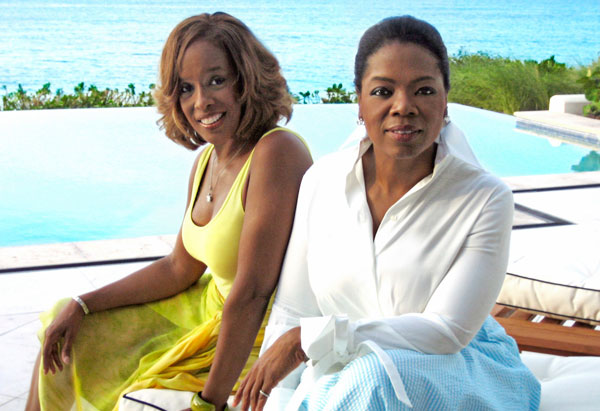One Incredible Journey: The Ultimate Oprah and Gayle Conversation

Photo: Libby Moore
They've stood by each other through thick and thin, kids and cocker spaniels, haircuts and headlines. They've seen the world change and they've seen themselves change. And today Oprah Winfrey and Gayle King are sitting down to talk about what, for Oprah, is the biggest change in 25 years: the end—after more than 4,500 episodes—of The Oprah Winfrey Show. To understand how that will feel, you have to understand how it all began...
Gayle: I have a very clear memory of the moment, I guess it was about 16 or 17 years ago, when it hit me that you weren't just hosting a talk show—that this thing you were creating was so much more. We were caught in a traffic jam in Racine, Wisconsin, because everyone was headed to the concert hall where you were speaking.
Oprah: Oh, I remember that. We pull up to the place, the cops are lined up in double rows, and you go, "What's happening here? Who's here? Who's here?" And I go, "I am, you nitwit!" [Laughter]
Gayle: I just could not wrap my head around it. So, I'm wondering, was there a moment like that for you, where you just went, "Whoa, I don't think we're in Kansas anymore"?
Oprah: You know, the philosophy in television is that you visit the cities where you're not doing so well in the ratings, to try to prop yourself up there. But I've always believed you should applaud the people who are already applauding you. So pretty early on we went to this little town in Texas, where you'd go down the street and every household that had a TV was watching the Oprah show. And we actually filled a stadium. There were people of all ages, races, every single possible demographic. People with their children on their shoulders. I think that's when I first got it. And one of the most revelatory moments recently, where I really "got" got it, was in Australia. Doing the show there and getting the welcome we got was eye-opening, because I'm normally just here in my little Harpo village. I go from home to work to home to work to Los Angeles to Santa Barbara. And that's my world.
Gayle: Yeah. You're not really a hang-out kind of girl, going here and going there. Your life is very contained.
Oprah: The first few years when the staff was still less than 12 people, I used to hang out with them because we were doing live shows, and we'd be done by 10 A.M. We had four people in four chairs, and that was it. Those were the days where I'd be the one taking the lunch order. I would walk around asking, "Okay, is it gonna be Taco Bell today, or are we doing Wendy's?" [Laughter] And then we'd go out and party at night.
Gayle: Do you ever miss those times?
Oprah: I certainly had a lot more fun back then, because that group was my family—we did everything together. But as we grew, things had to change. You've got to have separation of church and state.
Gayle: Who finally taught you that? How did you figure it out?
Oprah: My growth as a professional and as a human being has been propelled by the help of other people. Maya Angelou. And Quincy Jones, from the time I did The Color Purple. And Sidney Poitier. And Bill Cosby. That was my elder council.
Remember when I first announced that I'd been sexually abused? And then I announced that I'd done drugs? Well, I picked up the phone one day, and there was Bill Cosby on the line, and he goes, "Sis, do you have any children in an orphanage?" I said, "What?" He goes, "Do you have any children in an orphanage somewhere?" I said, "No." He goes, "Cuz if you do, tell me now, so you don't have to go and tell everybody about it." [Laughter]
Gayle: But do you regret having told those things?
Oprah: No, I don't regret having told anything. Can you imagine trying to hold a secret in today's world? I mean, you'd live in the shadow of that all the time—who's gonna discover it, and who's gonna sell you out. So I don't regret having talked about my life. The show has been my therapy, to answer the question you were getting ready to ask. I've never had a day's therapy, but I've had many days of listening to really excellent therapists, starting with Dr. Phil, who is beyond excellent at what he does.



